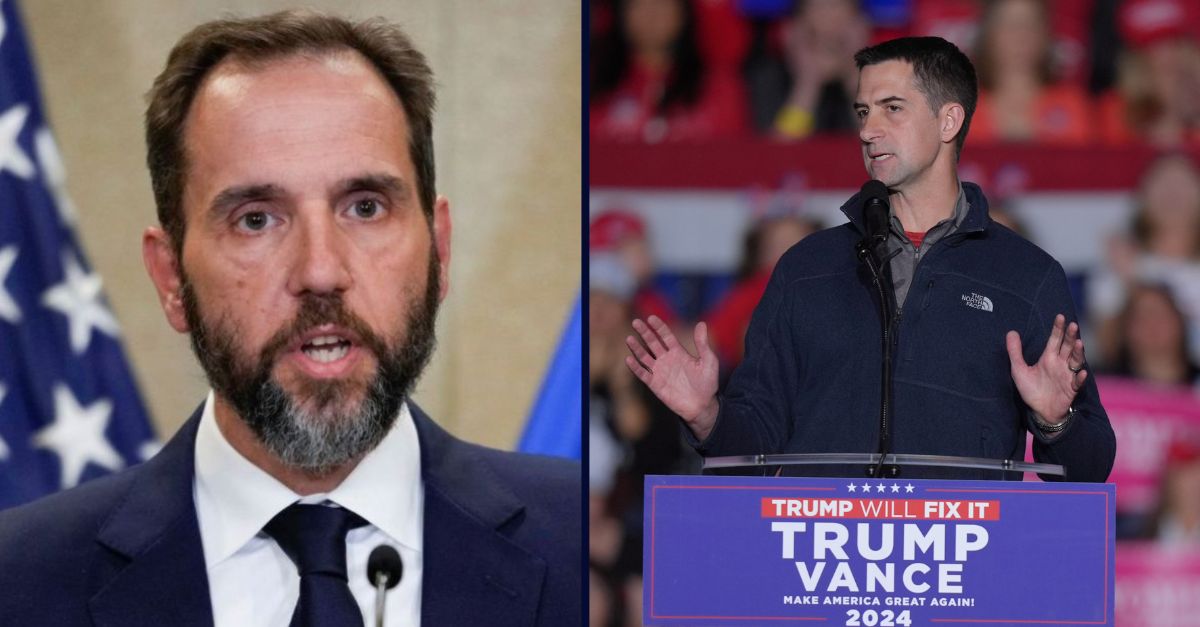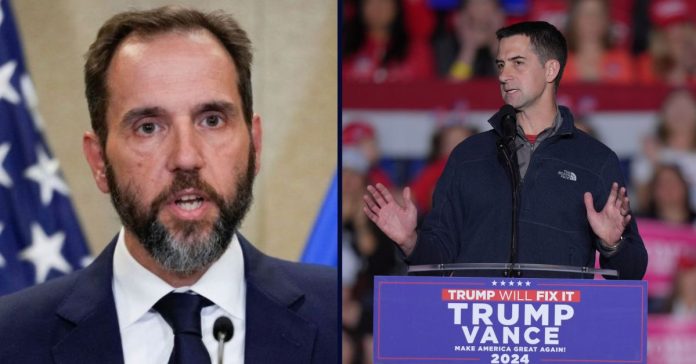
Left: Special counsel Jack Smith speaks to the media about an indictment of former President Donald Trump, Aug. 1, 2023, at an office of the Department of Justice in Washington (AP Photo/J. Scott Applewhite, File). Right: Sen. Tom Cotton, R-Ark., speaks before Republican presidential candidate former President Donald Trump at a campaign rally, Monday, Nov. 4, 2024, in Reading, Pa. (AP Photo/Chris Szagola).
Several weeks after Sen. Tom Cotton, R-Ark., filed an ethics complaint against former special counsel Jack Smith, broadly complaining about the way President Donald Trump was investigated and prosecuted during his 2024 campaign, Smith”s lawyers have responded that the attempt to allege violations of the Hatch Act are “unprecedented” and doomed to fail.
Recall that Cotton called for an investigation into whether Smith “unlawfully took political actions to influence the 2024 election to harm then-candidate President Donald Trump,” claiming that “many” of the then-special counsel’s “legal actions seem to have no rationale” beyond mere politics.
In a letter to the Office of Special Counsel (OSC) and its acting head Jamieson Greer, however, Covington & Burling attorneys Lanny Breuer and Peter Koski insisted that allegations of unlawful “political activity” on the part of Smith are “wholly without merit,” and offering up at least five key reasons why Cotton’s “predicate” for demanding the probe is “imaginary and unfounded.”
1. This “unprecedented interpretation” of the Hatch Act statute would mean former public officials, merely by seeking reelection, could avoid prosecution.
We are aware of no court decision, prior Office of Special Counsel finding, or other authority interpreting the Hatch Act to prohibit prosecutors from investigating allegations of criminal conduct committed by former public officials or candidates for public office, or prosecuting those cases when the facts and law so dictate. Application of such an unprecedented interpretation of the statute risks interfering with the Department of Justice’s ability to investigate and prosecute public officials or candidates for public office. Such an interpretation also cannot be squared with the numerous historical cases that the Justice Department has successfully brought against public officials for wrongdoing.
2. Complaints about page limits, fast-tracked appellate proceedings, and “routine” prosecutorial actions do not a Hatch Act violation make.
For instance, in support of his assertion, Senator Cotton cites such unremarkable examples as Mr. Smith seeking “special permission to exceed the normal maximum page limit,” asking for a trial date five months after the indictment, and “moving for an expedited review by the appeals court.” These routine actions are consistent with and expected of a prosecutor who is prosecuting a case, and they were subject to court approval.
3. Trump’s Jan. 6 judge signed off on Smith’s push to prosecute Trump up to and through the election.
The court overseeing the prosecution of President Trump in the District for the District of Columbia reaffirmed this bedrock principle that the justice system is not subservient to politics, repeatedly expressing that President Trump’s campaign for President has no bearing on the judicial process: ” [T]he fact that [President Trump is] running a political campaign currently has to yield to the orderly administration of justice.” […] “I cannot , and I will not, factor into my decisions the effect it’s going to have on a political campaign for either side.”
4. Trump’s selective and vindictive prosecution claims, and complaints about the timing of his prosecutions, failed in court.
In fact, courts have already considered and rejected the premise of Senator Cotton’s allegation — that the Special Counsel’s prosecutorial actions and their timing had “no rationale except for an attempt to affect the 2024 election results.” For instance, one court denied a motion to dismiss that alleged the prosecution was selective and vindictive, explaining that “this case illustrates the hazards of relying solely on the timing of charges,” and concluding that “the timing of this case’s prosecution ‘is evidence only of restraint and careful pursuit of potential investigative leads, not vindictive prosecution,’ especially given that ‘probable cause [was] found by a grand jury for indictment.”
5. Smith followed the Richard Nixon precedent when he requested and did not receive certiorari before judgment on Trump’s “absolute immunity” claims at the Supreme Court.
When litigating access to the White House tapes in the investigation of President Nixon, the Special Prosecutor filed a petition for certiorari before judgment, which bypassed the court of appeals and moved the case directly to the Supreme Court from the district court. There, the Supreme Court granted the petition for certiorari before judgment “because of the public importance of the issues presented and the need for their prompt resolution.” Mr. Smith merely followed this precedent and pursued the same appellate litigation path established by the Supreme Court 50 years earlier.
As Law&Crime has reported, the OSC states that violations of the Hatch Act can result in “removal from federal service, reduction in grade, debarment from federal service for a period not to exceed 5 years, suspension, letter of reprimand, or a civil penalty not to exceed $1,000.”
Of note, Smith is not currently in federal service, meaning that a reprimand and fine might be the most serious repercussions he’d face — if the investigation goes anywhere.

